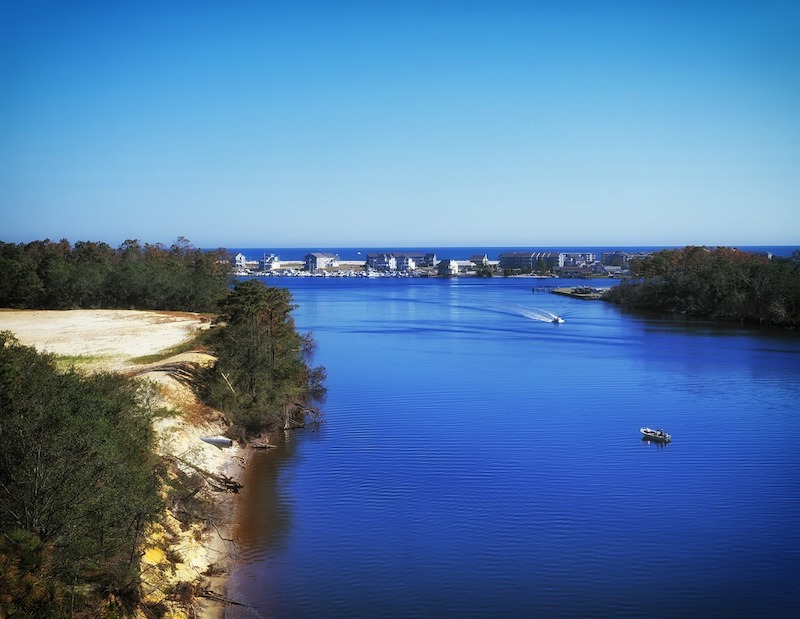A 2012 law that restricts taking into account the latest research in climate science could make North Carolina more vulnerable to Hurricane Florence.
The law banned policy makers from using recent climate science data to plan for sea level rise including things like elevation requirements on new buildings in flood-prone areas. The law was reportedly a response to a 2010 Coastal Resources Commission report that predicted sea levels on the Carolina coast would rise 39 inches by 2100.
The bill required the commission to write a new sea-level-rise report that limited its scope to the next 30 years. It was also required to take into account scientific studies refuting sea level rise, and to weigh the economic cost of limiting coastal development.
Scientists say the law is misguided, and will ultimately hurt the region’s ability to withstand damage from major storms. According to a recent article by a retired Duke University coastal geologist, the state should increase setback lines for coastal development, raise the height of buildings, move threatened buildings, prohibit rebuilding of storm-destroyed buildings, and begin a planned retreat from the rising water line.
Related Stories
| Sep 8, 2011
Pilot ISO 50001 Implementations Report Big Energy Savings
The International Organization for Standardization (ISO) recently published ISO 50001 to provide a recognized framework for integrating energy performance into management practices.
| Sep 8, 2011
USGBC Revises Energy Demand Response Credit
Originally launched in 2010, the revised and enhanced Demand Response Pilot Credit establishes guidelines that are anticipated to increase participation in automated energy demand response programs.
| Sep 8, 2011
Water Safety in Buildings Guide Published by World Health Organization (WHO)
This WHO book provides guidance for managing water supplies in buildings where people may drink water, use water for food preparation, wash, shower, swim or use water for other recreational activities or be exposed to aerosols produced by water-using devices, such as cooling towers.
| Sep 7, 2011
NFPA Fire & Life Safety Conference in December
Presentations on recent Fire Protection Research Foundation projects, how September 11th and the Triangle Shirtwaist Factory fire affected high rise design, and a panel discussion on emerging code issues will be featured at the National Fire Protection Association (NFPA)’s Fire & Life Safety Conference on December 12-14 in Orlando, FL.The meeting will include more than 60 educational sessions in which participants can earn continuing education units (CEUs). Presentations will be led by NFPA staff experts and technical committee members, and will be organized in four tracks – building and life safety, detection and alarm, fire suppression, and codes and standards. For more information, visit www.nfpa.org/FLSCONF.
| Sep 1, 2011
Project Aims to Automate Code Compliance Assessment
FIATECH, a consortium of owners from the industrial, power, and retail markets that build large structures, launched a project this year to validate the use of automation technology for code compliance assessment, and to accelerate the regulatory approval process using building models. Long-term objectives include the development of an extensive, open-source rule set library that is approved by industry and regulatory bodies for use by technology developers and code officials.
| Sep 1, 2011
EPA Says Additional Lead Paint Cleaning Rules Not Necessary
The EPA has concluded that current Lead: Renovation, Repair, and Painting Program (LRRP) cleaning requirements and lead-safe work regulations are sufficient to protect the public from lead dust hazards. “Our members have been instrumental in contacting legislators to detail the detrimental impact of the current LRRP," says Richard Walker, American Architectural Manufacturers Association’s president and CEO. “This collective industry voice has prompted the EPA to make the responsible decision to refrain from adding further, unnecessary costs to homeowners under the current economic climate."http://www.aamanet.org/news/1/10/0/all/603/aama-commends-its-members-congress-for-vacating-lrrp-clearance-rule
| Aug 11, 2010
Best AEC Firms of 2011/12
Later this year, we will launch Best AEC Firms 2012. We’re looking for firms that create truly positive workplaces for their AEC professionals and support staff. Keep an eye on this page for entry information. +







